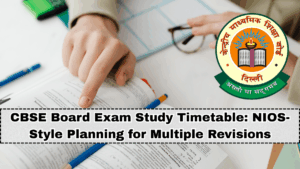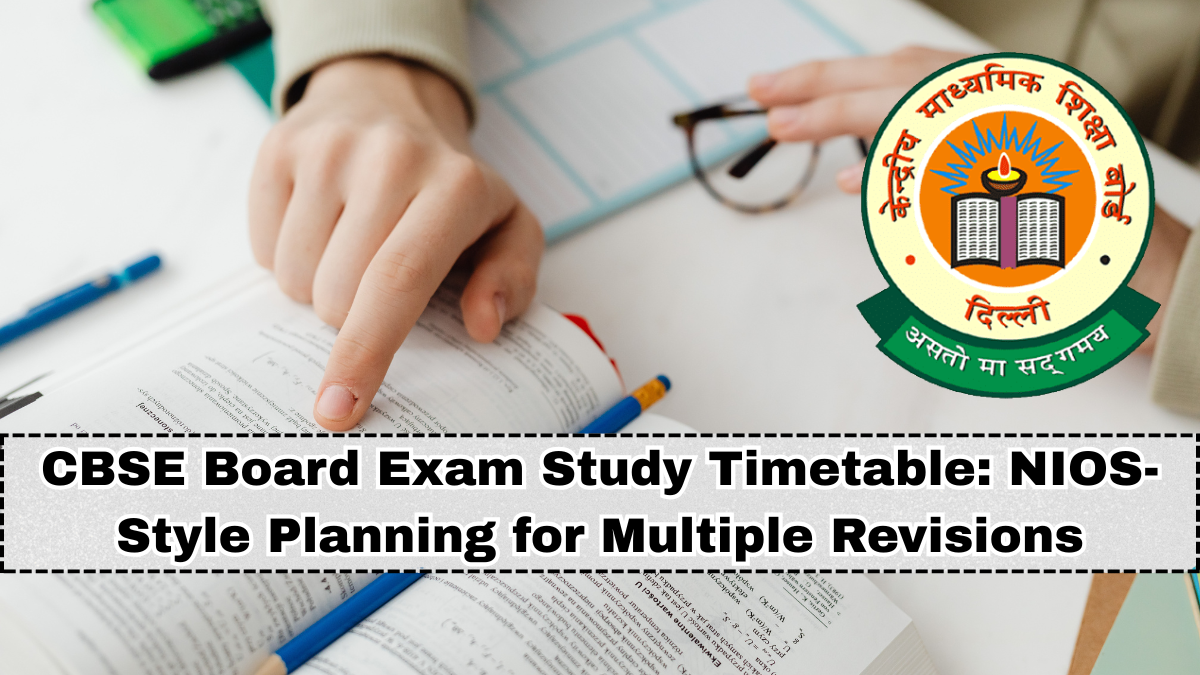Success in CBSE Class 10 and 12 exams depends less on long hours and more on structured revision. NIOS toppers swear by a simple rule — revise the syllabus multiple times in blocks instead of cramming everything in one go. This method keeps concepts fresh, reduces stress and improves recall during the actual exam.
This NIOS-style approach focuses on short daily targets, spaced revisits and a rotation plan that allows students to cover each subject three to four times before boards. It works for both Class 10 and Class 12 students who want clarity instead of chaos.

How the NIOS-Style Plan Works
The NIOS system is built on independent learning and repeated revision. Students study a limited number of topics daily and revisit them at fixed intervals. This ensures that even difficult chapters stay fresh throughout the preparation period.
Your goals here include:
-
Dividing each subject into small, manageable blocks.
-
Revising these blocks at consistent intervals.
-
Keeping weekends for solving sample papers.
This method also reduces burnout because you never study one subject for too long at a stretch.
Step-by-Step Weekly Structure
Each week follows a predictable rhythm. Students rotate subjects while finishing daily blocks of theory and questions.
A typical weekly plan looks like this:
-
Three subjects per day with one hour each.
-
One revision block of already-covered chapters.
-
One short test at the end of the week.
This ensures constant engagement with the syllabus while maintaining steady progress.
Monthly Revision Loop for Class 10 & 12
You can complete three full revisions before boards by following this loop. Every month is divided into learning, practice and revision phases.
Your monthly goals include:
-
Completing the full syllabus once in four to six weeks.
-
Using the second month for deep revision of tough chapters.
-
Solving previous-year papers in the final month.
This structure mirrors the flexibility of NIOS and keeps preparation predictable.
Subject-Wise Strategy for Better Scores
Different subjects need different approaches. NIOS-style planning encourages adjusting methods for each one.
Focus on these core strategies:
-
For Science: diagrams, definitions and exemplar questions.
-
For Maths: daily practice of mixed problem sets.
-
For Social Science: map work and repeated concept recall.
-
For English: writing practice three times a week.
This keeps the workload balanced and prevents last-minute panic.
Using Sample Papers and PYQs
Sample papers are a major part of this timetable. Instead of solving random tests, students use a structured approach.
Make sure you:
-
Solve two papers every weekend.
-
Analyse mistakes and revise weak chapters.
-
Practice time-bound writing in the last two months.
This builds confidence and exam discipline.
FAQs
How many revisions are needed for CBSE boards?
Three to four full revisions give most students a strong score boost.
How much should Class 12 students study daily?
Four to five focused hours are enough when following a structured block plan.
Is this timetable suitable for late starters?
Yes. Even if you start late, following the monthly loop improves retention.
Do NIOS-style methods work for all subjects?
Yes. The spaced revision approach works across subjects because it improves long-term memory.
Click here to know more.
